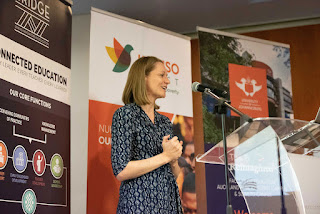Education Conversations: Fostering Dialogue for Growth and Innovation
Education conversations play a pivotal role in shaping the future of learning, teaching, and educational policies. These dialogues bring together educators, policymakers, students, parents, and stakeholders to discuss challenges, share insights, and explore innovative solutions. From addressing the needs of diverse learners to discussing the impact of technology on education, these conversations drive progress and promote lifelong learning. Here's a look at the importance of education conversations and how they contribute to the advancement of the education sector.
Why Education Conversations Matter:
Sharing Best Practices:
Education
Conversations provide a platform for educators to share
successful teaching methods, strategies, and classroom practices. This exchange
of ideas helps improve teaching quality and student outcomes.
Addressing Challenges:
By discussing challenges such as student engagement, learning gaps, and
resource limitations, education conversations enable stakeholders to
collaborate on solutions. This collaborative approach fosters innovation and
efficiency.
Policy Development:
Policymakers rely on education conversations to gather insights from experts
and stakeholders when formulating educational policies. These discussions
ensure that policies align with the needs of students and educators.
Empowering Students:
Including students in education conversations gives them a voice in their
learning journey. It allows them to express their needs, preferences, and
challenges, leading to more student-centered approaches.
Lifelong Learning Promotion:
Education conversations emphasize the importance of lifelong learning and
professional development for educators. They encourage continuous improvement
and staying abreast of the latest educational trends.
Topics of Education Conversations:
Technology Integration:
Discussing how technology can enhance learning, from online resources to
interactive tools and digital classrooms.
Inclusive Education:
Addressing the needs of diverse learners, including students with disabilities,
English language learners, and those from marginalized communities.
Assessment and Evaluation:
Exploring new methods of assessment that go beyond traditional tests to measure
holistic student growth.
Curriculum Development:
Creating relevant and engaging curriculum that prepares students for the
challenges of the future workforce.
Parent and Community Engagement:
Recognizing the role of parents and communities in supporting student success
and fostering partnerships.
Teacher Training and Support:
Providing ongoing professional development opportunities and support for
educators to excel in their roles.
Platforms for Education Conversations:
Conferences and Workshops:
Educational conferences bring together educators, researchers, and policymakers
to discuss the latest trends and innovations in the field.
Online Forums and Webinars:
Virtual platforms allow for global participation in education conversations,
enabling diverse perspectives to be heard.
School and District Meetings:
Local education conversations at the school and district level focus on
specific needs and challenges within the community.
Think Tanks and Research
Institutes: These organizations conduct studies and host
discussions on pressing education issues, providing evidence-based insights.
Social Media and Blogs:
Educators and stakeholders use social media platforms and blogs to share ideas,
resources, and engage in conversations about education.
Benefits of Participating in Education Conversations:
Networking Opportunities:
Education conversations offer a chance to connect with like-minded
professionals, build partnerships, and collaborate on projects.
Professional Growth:
By engaging in discussions and staying informed about the latest trends,
educators can enhance their teaching practices and leadership skills.
Advocacy and Influence:
Active participation in education conversations allows stakeholders to advocate
for policy changes and reforms that benefit students and educators.
Inspiration and Motivation:
Being part of education conversations exposes individuals to innovative ideas
and success stories, inspiring them to strive for excellence.
Empowerment:
Education conversations empower participants to make informed decisions, take
ownership of their learning, and contribute to positive change in the education
sector.
Examples of Impactful Education Conversations:
Panel Discussions on Inclusive
Education: Bringing together educators, parents, and experts to
discuss strategies for creating inclusive learning environments for all
students.
Webinars on Digital Literacy:
Hosting online sessions to educate educators and students on the importance of
digital literacy skills in today's digital age.
Community Forums on Mental
Health Awareness: Engaging parents and community members in
conversations about supporting student mental health and well-being.
Teacher Workshops on Culturally
Responsive Teaching: Providing professional development
workshops to help educators better meet the needs of diverse student
populations.
Policy Roundtables on Education
Funding: Inviting policymakers, educators, and stakeholders to
discuss effective allocation of resources to improve student outcomes.
Conclusion:
Education conversations are
essential for driving innovation, collaboration, and improvement in the
education sector. By fostering dialogue among educators, policymakers,
students, parents, and communities, these conversations lead to the development
of effective teaching methods, inclusive policies, and impactful solutions to
educational challenges. From technology integration to curriculum development
and student empowerment, education conversations shape the future of learning
and ensure that every student has access to quality education. Participating in
these conversations not only benefits individuals but also contributes to the
collective advancement of the education system as a whole. Let's continue to
engage in meaningful education conversations to create a brighter future for
learners around the world.
For more info. visit us:
south african funding
organisations



Comments
Post a Comment